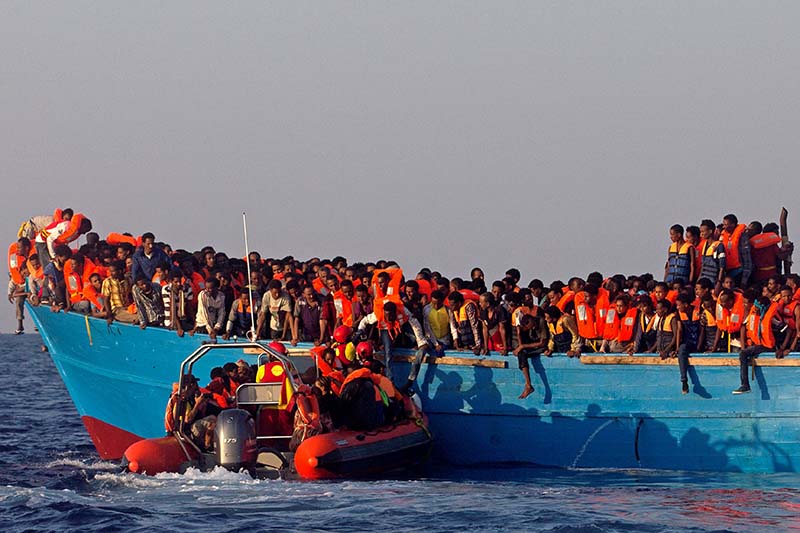Italy OKs migrant transfer after insisting on UK approval
MADRID/ROME: Italy's coast guard said Monday it had granted authorization for 105 migrants rescued at sea by a Spanish aid group to transfer to a sturdier boat after more than a daylong bureaucratic tussle left them exposed to the elements on the Mediterranean Sea.
It was the second time in as many months that Italy has delayed allowing rescued migrants to reach safety by insisting on bureaucratic formalities in what appears to be a strategy to dissuade aid groups from rescuing migrants.
Spain's Proactiva Open Arms said the migrants, including six children and 32 unaccompanied teenagers, were in stable condition Monday but they were exposed to bad weather and living in inappropriate conditions aboard the Astral, a sailing vessel turned rescue ship that Proactiva has used for emergency assistance. Aquarius, a bigger rescue ship of the French SOS Mediterranee nonprofit group, waited for much of Monday to take them to a safe port.
The nonprofits said the vessels —both sailing under the British flag— had been waiting for authorization since early Monday at around 25 nautical miles (28.75 statute miles) off the town of Khoms on the Libyan coast. Italy's coast guard said the British had to grant authorization for the transfer, but Britain said it wasn't coordinating the rescue.
"They are throwing the ball at each other and we are in the middle," said Astral's captain Riccardo Gatti, blaming Italian and British authorities more than 30 hours after the migrants were rescued from a drifting and engineless rubber boat.
"The situation is becoming unbearable due to worsening weather, cold and the health and hygiene conditions onboard," he added.
Another rescue ship of Proactiva was seized for weeks by Italian authorities before a judge in Sicily ordered its release earlier this year. Prosecutors are still investigating whether the non-governmental organization's crew should face charges of criminal association and aiding illegal immigration.
The British Maritime and Coast Guard Agency said it was aware of the incident and in contact with search and rescue authorities in the area, but said the incident was "not coordinated" by Britain.
The Italian coast guard said the delay in transferring the migrants was due to Britain, since both rescue ships were British-flagged. Late Monday, the coast guard issued a second statement saying it had allowed for the transfer because of the late hour and because British authorities hadn't given any indication on how to proceed.
Previously, the Italian coast guard has said international norms require the flag nation to request authorization for one of its ships to dock — a requirement it hadn't enforced before its recent crackdown on migrant landings.
Matthew Carter, a communications officer with SOS Mediterranee, said the NGO's standard procedure "is to wait for a green light from the coordinating authority (usually the Italian Maritime Rescue Coordination Center) before proceeding with a transfer or rescue operation."
But Carter said his organization had informed all parties that in the event of an emergency it planned to take all rescued people on board without pre-authorization.
Each year, tens of thousands of migrants attempt to reach European shores by crossing the Mediterranean in smugglers' boats. Most of the vessels are unfit for open water, and thousands of migrants drown each year.
The U.N. says 615 migrants have died crossing the Mediterranean so far this year. A total of 22,439 migrants have reached European shores through the first four months of 2018.
Italy has significantly reduced the migrants arriving on its coasts by helping the Libyan coast guard beef up its patrols, reducing the number of aid groups performing sea rescues and — in a move criticized by some aid groups — negotiating deals with Libyan militias that had long profited from trafficking humans.
The migrants aboard the Astral are from Bangladesh, Egypt, Libya, Nigeria and other countries. They told The Associated Press on Sunday that human smugglers sailing in a separate boat removed their inflatable's engine halfway through the dangerous Mediterranean crossing and left.






